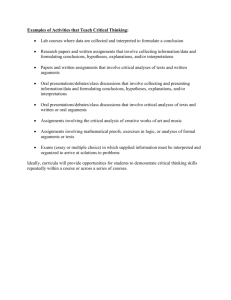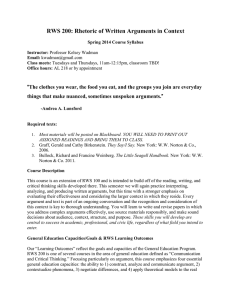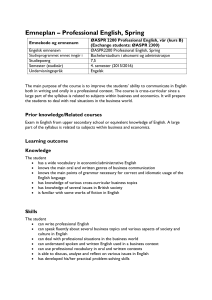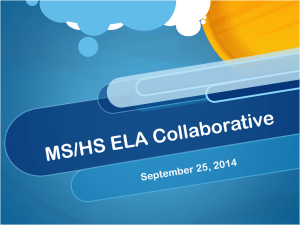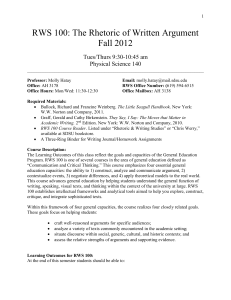rws 305w course info
advertisement
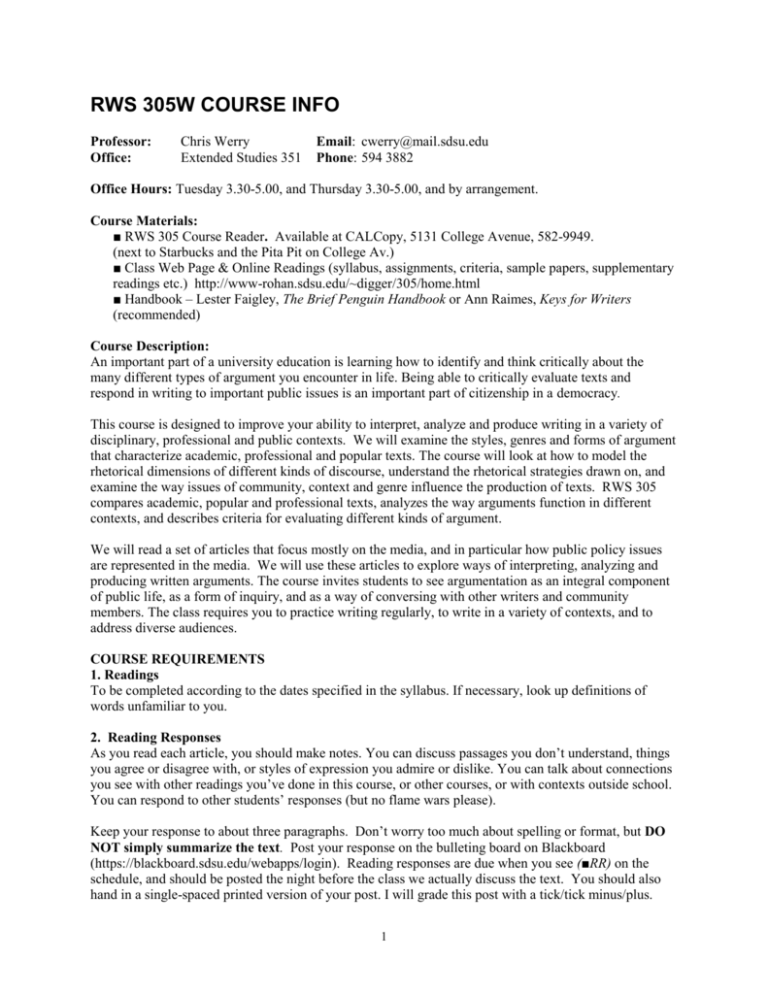
RWS 305W COURSE INFO Professor: Office: Chris Werry Extended Studies 351 Email: cwerry@mail.sdsu.edu Phone: 594 3882 Office Hours: Tuesday 3.30-5.00, and Thursday 3.30-5.00, and by arrangement. Course Materials: ■ RWS 305 Course Reader. Available at CALCopy, 5131 College Avenue, 582-9949. (next to Starbucks and the Pita Pit on College Av.) ■ Class Web Page & Online Readings (syllabus, assignments, criteria, sample papers, supplementary readings etc.) http://www-rohan.sdsu.edu/~digger/305/home.html ■ Handbook – Lester Faigley, The Brief Penguin Handbook or Ann Raimes, Keys for Writers (recommended) Course Description: An important part of a university education is learning how to identify and think critically about the many different types of argument you encounter in life. Being able to critically evaluate texts and respond in writing to important public issues is an important part of citizenship in a democracy. This course is designed to improve your ability to interpret, analyze and produce writing in a variety of disciplinary, professional and public contexts. We will examine the styles, genres and forms of argument that characterize academic, professional and popular texts. The course will look at how to model the rhetorical dimensions of different kinds of discourse, understand the rhetorical strategies drawn on, and examine the way issues of community, context and genre influence the production of texts. RWS 305 compares academic, popular and professional texts, analyzes the way arguments function in different contexts, and describes criteria for evaluating different kinds of argument. We will read a set of articles that focus mostly on the media, and in particular how public policy issues are represented in the media. We will use these articles to explore ways of interpreting, analyzing and producing written arguments. The course invites students to see argumentation as an integral component of public life, as a form of inquiry, and as a way of conversing with other writers and community members. The class requires you to practice writing regularly, to write in a variety of contexts, and to address diverse audiences. COURSE REQUIREMENTS 1. Readings To be completed according to the dates specified in the syllabus. If necessary, look up definitions of words unfamiliar to you. 2. Reading Responses As you read each article, you should make notes. You can discuss passages you don’t understand, things you agree or disagree with, or styles of expression you admire or dislike. You can talk about connections you see with other readings you’ve done in this course, or other courses, or with contexts outside school. You can respond to other students’ responses (but no flame wars please). Keep your response to about three paragraphs. Don’t worry too much about spelling or format, but DO NOT simply summarize the text. Post your response on the bulleting board on Blackboard (https://blackboard.sdsu.edu/webapps/login). Reading responses are due when you see (■RR) on the schedule, and should be posted the night before the class we actually discuss the text. You should also hand in a single-spaced printed version of your post. I will grade this post with a tick/tick minus/plus. 1 The responses you do over the course of the semester will count as a big part of the participation grade (they will be evaluated on whether they are sufficiently numerous and extensive, and show some serious reflection.) I will look for improvements in the way you interpret arguments, and in your use of the categories and criteria discussed in the class for the analysis of arguments. 3. Attendance: Discussion and in-class work are central to this course, and attendance is important. If you miss more than 3 classes one full grade (10 points) will be deducted from your final class grade. I assume that everyone comes to class to participate in that day’s activities. If someone is working on other classes, reading newspapers, magazines, etc., I will count that student as absent that day. 4. In-class writing exercises and tests From time to time I will set short writing assignments and quizzes to be done in-class. These exercises will test your understanding of the concepts we are discussing in class, as well as the content of the articles we read. These assignments will count for half of your participation grade, or 10% of the overall grade. 5. Formal Writing Assignments You will do three formal writing assignments. Note that you must complete all 3 writing assignments to pass the course. 6. Participation Participation, in-class work, peer review work, and assorted short writing exercises will count for 10 points. ASSIGNMENTS Assignment Writing Research Paper & Resume Argument Sketch Fallacies/Demagoguery presentation Civic Writing Assignment Final Paper Exercises & Tests Reading Responses & Participation Max. Pts 15 05 05 15 30 10 20 Due Date October 06 October 20 October 27 November 17 Last day of class Assignment Format: all papers must be typed and double spaced, using standard margins, 12 pt type size and regular spacing. Include your name, the date and the assignment title. Make sure you hand in a copy of your assignment, NOT the original. Where to hand assignments in: give them to me in class. If this isn’t possible for some reason (e.g. sickness) put your assignment in my mailbox in Extended Studies 303. Late Penalties: late assignments are penalized 2 points per day. I will accept one late paper, provided I get prior notice. Plagiarism: don’t even think about it. Plagiarism will result in an automatic fail. I use the turnitin.com service, along with plagiarism detection software to check all papers. Problems: see me. If the contact hours specified clash with your classes/work, we can work out an alternative time to meet. E-mail is often the best way to get in contact with me. Using Additional texts 2 Many of the articles we will read will have clear links between them – some directly criticize each other, some draw on each other as support, and some engage with the general theoretical positions held by other authors. As you come to figure out your own position with respect to the arguments we will read, you may want to locate supplementary articles from the web, library, or newspaper. Depending on which issues you choose to focus on when working on your analysis and final paper, you may find that you wish to use texts other than those we read in the class. Thus you may want to keep an eye out for articles or newspaper reports that relate to a topic area you are interested in, and start making notes on media experiences that you think could be useful. General Notes Classes will consist of some lectures, but will be largely oriented around in-class discussion and activities. I hope that our class sessions will be lively and interactive. Everyone will be asked to lead discussion on an article at some point. I expect you to be critically engaged with the positions taken in the texts we read, and with the positions of your classmates. However I also expect you to be respectful and courteous to others in the classroom. I may sometimes copy and share your papers (anonymously) with the class to use as examples of an effectively written essay or as sample texts on which to make revisions, so please avoid subjects you would not feel comfortable sharing with your classmates. Email Reminders I will send you email from time to time. Please make sure your email address works. If you send me a message, include your name (superstud@aol.com isn’t very informative.) If you change your email address, make sure you enter your new address in the SDSU e-Services WebPortal at https://sunspot.sdsu.edu/e-services/. This will update your blackboard address also. Changes to the Syllabus I will sometimes need to make a few changes to the syllabus as the class progresses. If this happens I will provide you with an updated syllabus. 3
